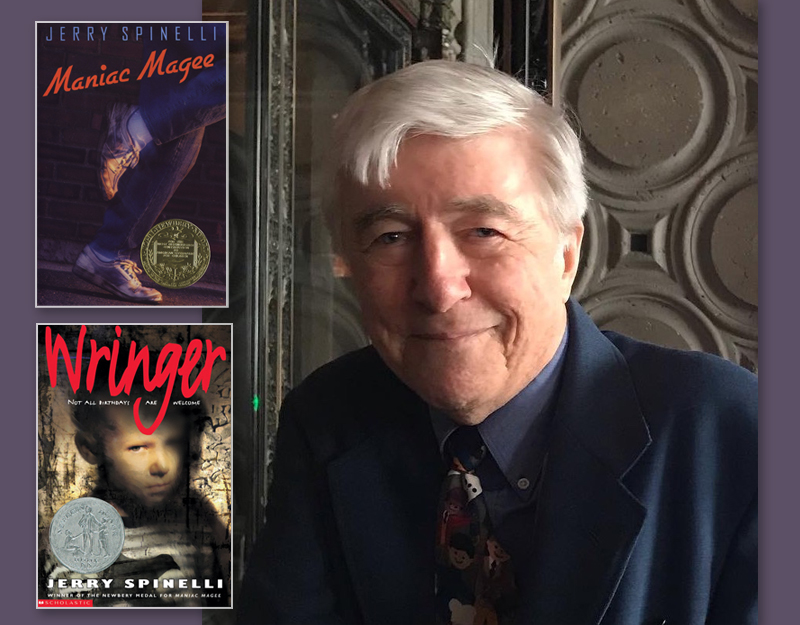Jerry Spinelli: "I Just Try to Write a Good Story" | The Newbery at 100
Spinelli, known for spot-on portrayals of early adolescence, talks about unexpected rewards of the Newbery Medal, “star people,” and creating harmony with characters and story elements.

Jerry Spinelli won the Newbery Medal in 1991 for Maniac Magee (Little, Brown) and a Newbery Honor in 1998 for Wringer (HarperCollins). He has published 36 books for young readers, and his middle grade fiction is widely praised for its depiction of early adolescence.
It's been several decades now since Maniac Magee won the 1991 Newbery Medal. Looking back on that experience, how has it shaped your career as a writer? What has been the greatest good fortune to come from the experience of writing Maniac Magee, the Newbery Medal, and the subsequent reader responses?
I've never again looked at want ads for a job. It made my ultimate dream possible—that is, not just to get published, but to make a living writing stories. I've come also to cherish unexpected developments that few ever hear of. Hundreds of copies of Maniac Magee, for example, were distributed throughout South Africa as part of the effort to dismantle Apartheid.
Few authors win Newbery recognition, and fewer still are recognized multiple times. But later in the same decade that Maniac Magee won, Wringer scored a 1998 Newbery Honor. What does it feel like to belong to such an exclusive group of authors? And how did this Newbery experience compare with your first recognition?
The Newbery Honor experience is special in its own lower-key way. You're almost leading the parade; you're perched on the backseat of the second convertible.
The 90s were a good decade for the Newbery—lots of middle grade fiction with tremendously broad child appeal. That description just as easily applies to the entire Jerry Spinelli canon, particularly with books like Crash, Loser, Milkweed, and Eggs, among others. What are the necessary ingredients for a Jerry Spinelli book? And how come they so consistently resonate with young readers?
I thought once that if I had to describe my novels in one word, I would choose "harmony." Harmony among characters and among story elements. Consistently resonate? I guess the readers could best answer that. I just try to write a good story. They must recognize themselves and their lives. I remember a reader once wrote to me: "How do you know what it's like to be me?"
Despite a lack of Newbery recognition, Stargirl has had incredible staying power. In fact, it may be your most enduringly popular book. How do you explain the strong affection for this title? Are there other books that seem to have struck a chord with readers –or that are a little closer to your own heart?
In 1966 I began writing notes for a story about a boy who lives underground (subway, tunnels). Thirty-four years later it emerged as a novel called Stargirl. It strikes a chord because there are a lot of star people out there. Loser seems to be another favorite about a distinctive kid.
Your most recent book, Dead Wednesday (Knopf, 2021), has received some great buzz from fans and critics alike, perhaps placing you once again on the Newbery radar. It's been praised for your trademark humor, sensitivity, and character development—with an interesting premise. Can you tell us how this book came about? And what can we look forward to in the future?
The idea came out of a letter from a teacher, whose school has a "Dead Wednesday" every year [where 8th grade students are assigned the identity of a teen “who died a preventable death” the year before]. I just followed the idea where it wanted to go...and to this day regret that I lost the letter and so cannot thank that angel teacher by name.
Jonathan Hunt is a coordinator of library media services at the San Diego County Office of Education. He served on the 2006 Newbery committee. Follow him on Twitter @jhunt24 .
RELATED
The job outlook in 2030: Librarians will be in demand
The job outlook in 2030: Librarians will be in demand
ALREADY A SUBSCRIBER? LOG IN
We are currently offering this content for free. Sign up now to activate your personal profile, where you can save articles for future viewing





Add Comment :-
Be the first reader to comment.
Comment Policy:
Comment should not be empty !!!